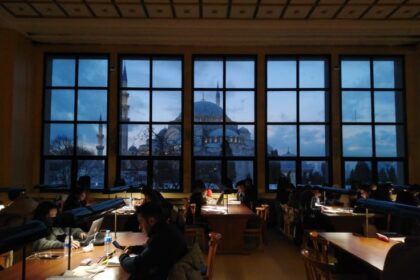A Systemic Collapse, Not an Isolated Failure
Ask anyone in Pakistan why the country’s education system continues to collapse, and you’ll hear between the lines of a familiar sentiment — “This country was a bad seed to begin with.” But the truth is more critical. The collapse of the Matric system, the politics embedded in the educational boards, and the relentless commercialisation of every sector — the real failure lies not within a specific system but in a collaborative arrangement of systemic failure. And now, even the much-glorified Cambridge Assessment International Education (CAIE) has become another casualty — a part of this broken machinery.
The Facade
The Cambridge Assessment International Education (CAIE) was once believed to be a golden ticket to the top-ranked universities — a gateway to otherwise unattainable opportunities. While it was considered an exceptional system, with a prime focus on “…delivering fair, valid and reliable assessments that offer a globally recognised performance standard for international education”, this statement now starkly contrasts the current pattern being observed.
Recurring paper leaks and poor scheduling have undermined its credibility — which has taken a toll on the mental and emotional well-being of students.
To put it into perspective, an average A-level student starts studying relentlessly from December of the preceding year. When a leak occurs, the paper is cancelled — and an expected grade is awarded. Let that sink in for a second. These students blur the line between night and day, studying every waking hour until their minds go numb. When such an incident occurs, one can only imagine a fraction of the wave of emotions and disappointment they experience. It not only undermines their effort but also shatters their hope and confidence for future examinations.
What makes matters worse is Cambridge’s recent policy addressing the rumours of the paper leaks. While many believed that Cambridge would take stern action against its own internal failures, it instead placed the burden on students — blaming them for believing in the leaked papers and for ‘cheating’.
The policy of awarding full marks to all candidates for leaked questions provides unearned support to those who relied on the leaks — while disregarding the efforts of those who appeared loyally and honestly for the exams.
As one teacher put it, “The syllabus isn’t the burden — it’s lifting the students’ morale after they’ve been let down by the system.”
When Prestige Becomes Plague
Unlike many other educational boards in Pakistan, CAIE was a mark of distinction — valued for its credible quality and limited availability, especially in major cities like Lahore, Karachi, and Islamabad. Until the early 2010s, institutional heavyweights like LGS, The City School, FPS, BSS, and Roots dominated the Cambridge landscape — having adopted the programme as early as the 1980s. However, by 2014, there had been a 4.4% year-on-year rise in exam entries — offering a clear, verifiable indicator of growing CAIE engagement in Pakistan.
With this expansion came an increased demand for teachers trained to teach the Cambridge curriculum. However, not everyone is cut out for it. Institutions in Pakistan are often more focused on collecting fees than on upholding academic merit.
How do you expect a teacher who is well-versed in the Matric system — which emphasises rote memorisation — to effectively teach a curriculum curated for critical thinking and conceptual knowledge? As one teacher pointedly stated, “Substandard teachers reduce the Cambridge curriculum to exam-cracking. It destroys curiosity and leaves students with weak concepts that collapse in A Levels.”
And a student echoed this same concern, noting, “Cambridge used to be limited to elite schools. Now it’s everywhere — but the quality isn’t monitored, the teachers aren’t always trained, and students are just paying for a label.”
Motives Over Merit
What began as a committed, selective pathway for academic brilliance has — over the years — drifted from its original purpose, not guided by merit, but by motives. As CAIE becomes more commonplace, it steadily loses the prestige that once set it apart — now arguably diluted. With recognition comes greed — and with greed, ulterior motives.
Behind the scenes, board politics, questionable affiliations, and influence games have begun to blemish a once-formidable system. This is most clearly evident in the recurring leaks — almost certainly the doing of insiders — eroding the trust of many and driving students towards alternative educational boards like Pearson, Edexcel, and others.
Even more concerning is how these incidents are being handled. Instead of issuing resits or re-evaluations that reflect true merit, CAIE has opted for shortcuts like awarding full marks for affected questions. This decision not only downplays the severity of the breach but also sidesteps the conversations around academic integrity.
The Price Tag on Brilliance
On average, a single student spends around 27,000–34,000 PKR per subject — and they study at least 7–10 subjects. It isn’t expensive — it’s exploitation. It is undeniable proof that education has become a mere business — not a right.
One teacher aptly observed, “Despite Cambridge being a non-profit, the exam fees are crushing for Pakistan’s middle class. Our weak currency only worsens the problem.” Another added, “Even though Cambridge claims to be a non-profit organisation, the fees for the exams are very high for the middle class in Pakistan — making it inaccessible to the less privileged.”
With inflation on the rise and job opportunities steadily shrinking, the public are scrambling for even a low-paying job of around 25,000–40,000 PKR/month.
So, why is the basic human right to education being stripped away from children with sharp minds and innovative ideas — simply because they can’t afford it?
In rural areas and underfunded urban schools, even the idea of sitting for CAIE exams feels like a distant dream — an unfair divide that grows wider every year. Why do we continue to claim “education is accessible to all” — when in reality, it is the ruling elite class who can educate their children with ease, while the rest are left behind — struggling, sacrificing, and working just to survive?
Monetising Doubt
Many things stand as a testimony to the plague of corruption spreading within the Cambridge system — one of them being the facility provided to re-check the exams, but again, at a cost of around 10,000 PKR.
If the grade changes, you are eligible for a full refund. However, the downside is that if the grade stays the same — there is no refund. This raises a serious concern: if the system is so confident in its marking, why is there a charge for something as basic as transparency? This isn’t an aid to the students — it’s a calculated revenue scheme that feeds off the uncertainty and anxiety of students. This entire process is one-sided — offering no guarantee of justice — only the students carry the cost.
It’s especially ironic when the same system that demands a price to confirm a student’s actual performance is willing to award free marks for leaked content. If fairness and transparency come at a cost, it raises serious doubts about CAIE’s claim of being a ‘just’ system — one that increasingly appears to hide behind the guise of integrity.
Shifting Loyalties
As CAIE continues to struggle to maintain its credibility and value, other foreign educational boards — like Pearson, Edexcel, and more — are seizing the opportunity to rise. One teacher noted, “Recent exam leaks in Pakistan have seriously damaged the credibility of Cambridge’s operations here. If they don’t improve, other foreign boards will take over.”
While many parents and students still prefer the Cambridge board due to its long-standing reputation and the familiarity of its alumni network, there has been a noticeable shift in trends.
Around 10–20% of CAIE students in Pakistan now consider switching to other educational boards — most commonly to FBISE or AKU-EB — before reaching A Levels. This shift speaks volumes about the spreading disillusionment with Cambridge as students and parents search for systems that offer more stability, transparency, and affordability.
Some of those who’ve made the switch to local boards report a surprising sense of relief — more accessible teachers, reasonable pricing, and a stronger sense of support.
Blueprint for Burnout
Indeed, the Cambridge system has long been defined by its rigid structure and focus on conceptual understanding — aiming to enhance students’ knowledge rather than feeding them information like machines.
However, it has increasingly become what many describe as an ‘exam-centric’ system — one that leaves very little room for creativity, project-based learning, or holistic evaluation.
In the case of O levels, students are taught the same syllabus for 3 years.
While many would argue that repetition equals mastery — in practice, it can reduce learning to mechanical recall, leaving students parroting information without deeper understanding. These bright, innovative minds are confined to the chains of a fixed curriculum — one in which some concepts cannot even be practically demonstrated.
It is worth pointing out: if Cambridge claims to honour virtue, why does it refuse to propose meaningful solutions — like optional resits or properly adjusted grading? The current patchwork remedies aren’t just restrictive — they undermine the shared experience of hard-working students.
As one teacher pointed out, “It is unfair to the students that they have to prepare again for such a comprehensive exam and go through the stress of exams again. Students should be facilitated better in circumstances like these — without compromising on the integrity of the exams.”
If they underperform on those specific days — regardless of their true potential — they are sidelined. The issue here isn’t the curriculum itself — it’s the narrow, unforgiving way in which it is assessed.
The Clock Reset
“It is unfair to the students that they have to prepare again for such a comprehensive exam and go through the stress of exams again,” one teacher reflected — a quiet reminder that this frustration echoes loudly across classrooms and households.
Cambridge exams demand months — if not years — of effort.
Yet, the negligence and systemic flaws reset the clock entirely — forcing students to relive the very stress they hoped to leave behind, with no fault of their own.
It’s not just the academic pressure — it’s the emotional and mental exhaustion, rebranded as resilience and courage.
Cambridge debates that its current approach spares students the stress of resits — yet it ignores the deeper, rooted anxiety caused by injustice. The mental toll of seeing grades distorted by leaks and flawed remedies is far more damaging than a fair, albeit difficult, second chance.
If the system claims to thrive on integrity, it must also safeguard the integrity of its students’ time, health, and effort.
Right now, that promise feels broken.
So, this is a silent plea to the Cambridge Assessment International Education (CAIE) — look beyond the glass-stained walls of prestige and popularity.
The trust built over decades still stands tall — but perhaps now the foundation is cracking.
And unless that foundation is reinforced — with fairness, accessibility, and genuine accountability — the cracks may soon turn into collapse.
















